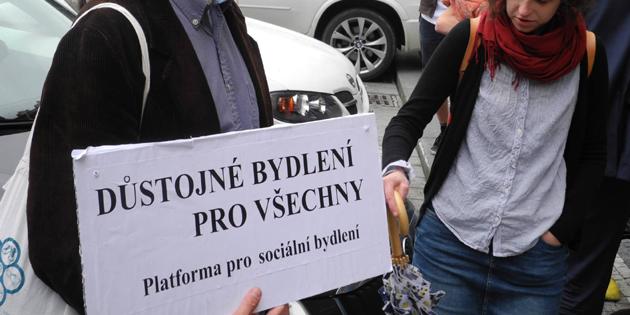Reporter Saša Uhlová, writing in Deník Referendum, has provided us with a very open description of the state of preparations for the law on social housing in the Czech Republic. A so-called national-level “Social Housing Office” (Úřad pro sociální bydlení) has made it into the law just because local authorities are refusing to administer social housing.
The municipalities’ refusal could have been assumed, as they have had other experiences with the state shifting liabilities to them without providing them with adequate resources to meet them. The role of the national Labor Office in the law (and the similarity of the proposed Social Housing Office to the Labor Office is no accident) is also a desperate ackowledgment by the Government that it is incapable of completing the historic task it set itself in its program declaration.
That task was to begin addressing housing the poor through the controlled assignment of rental housing, administered at the level of the municipalities. The state was supposed to provide the municipalites with significant support by covering the costs of social work, providing subsidies for the purchase and reconstruction of apartment units, verifying household incomes, and facilitating employment.
This new system was supposed to replace the existing one, in which housing benefits to cover rents are distributed directly to housing providers at the state level. Municipalities have justifiably criticized this approach, as they must cope with the consequences arising from such housing arrangements, which they see “on their plates” daily.
Who doesn’t like the law?
It has been calculated that managing apartment units, of which there are relatively enough in the Czech Republic (i.e., there is no need of any massive construction work) is far cheaper than throwing money away on the use of poor substitutes, such as residential hotels and sublets. This is something that conservative, right-wing politicians who view managing a state the same way they view managing a firm should understand.
Moldy residential hotels with bedbugs or overcrowded sublets kill the self-confidence of the adults who live in them as well as the talents of the children who live in them, to say nothing of harming their health and worsening their relationships in their neighborhoods, which is something that might impress the left wing and the parties based on Christian values. Why, then, has the law on social housing reached a dead end?
Who is to blame?
It is somewhat cheap to point the finger at a single politician to pillory here. Czech Labor and Social Affairs Minister Marksová (Czech Social Democratic Party – ČSSD) demonstrated bravery when, through her ministry’s comments on the first plan for the Government’s legislative work in 2014, she proposed putting the social housing law on her agenda.
It was clear that this would involve a “hydraulic” reduction to the volume of welfare benefits, which would generate a need to cover increased costs for housing-related services, i.e., social work provided to persons in need of housing. None of the “bricks” that the Regional Development Ministry (MMR) is responsible for providing could be used for such a purpose, as the MMR has demonstrated through the previous social housing programs arranged through the State Fund for Housing Development, which have been repeatedly assessed as failing to serve their purpose.
In 2014, the MMR, headed by an ANO movement appointee, agreed that the social housing agenda should be moved to the Labor and Social Affairs Ministry (MPSV). The MMR did so with the mocking remark that they were happy to let the MPSV “break their teeth on it”, and the MMR then actually let the MPSV do just that by refusing to do any work on the law at all.
ANO versus ČSSD
A weak Prime Minister (ČSSD), prepared to sacrifice his idiosyncratic Labor Minister (ČSSD), and a populist Finance Minister (ANO) adored by a Regional Development Minister (for ANO) intent on giving him an alibi – that is the main reason the social housing law in the Czech Republic is now a fiasco. A secondary reason is the ongoing inability of the Czech Republic’s public administration to stratify its social policy into the correct levels of administration according to the principle of subsidiarity – in other words, its inability to address matters at the level that is most effective.
In the countries that we consider as having functional welfare states, the state usually creates the legal norms (laws, methodologies, regulations) and then provides the resources (budgetary measures, loans, subsidies) to implement policy. Local administrations then follow the law because they have everything they need to do so.
A social housing law has been lacking here for a quarter of a century and now, at the beginning of 2017, it is dying – and this textbook principle of social policy implementation has not been correctly grasped by any Government in our country since 1999. Unfortunately that includes the current Governent of PM Sobotka.
This article was first published in Czech on the website of the Institute for Social Inclusion (Institut pro sociální inkluzi).

